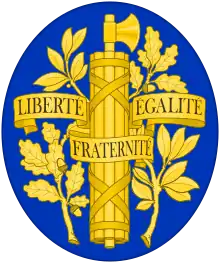 |
|---|
A referendum concerning the establishment of the French Empire was held in France in June 1804.[1] The result showed a virtually unanimous French electorate approving the change in Napoleon Bonaparte's status from First Consul to Emperor of the French, although the votes were most likely manipulated.[2][3][4]
Background
The plebiscite, provided for by article 142 of the Sénatus-consulte, relates to the question of the imperial succession as defined in the Constitution of 1804, which established the First Empire. The vote was public, permitting neither blank votes nor invalid ones.
Results
The counting of the votes ended in 2 August and the results were announced in 6 November.[1] A coronation ceremony was held a month later, on 2 December.
| Choice | Votes | % |
|---|---|---|
| 3,521,675 | 99.93 | |
| No | 2,579 | 0.07 |
| Total votes | 3,524,254 | 100.00 |
| Source: [5] | ||
| No : 2,579 (0.07%) |
Yes : 3,521,675 (99.93%) | ||
| ▲ | |||
References
- 1 2 Frankreich, ??. Juni 1804 : Napoleon als erblicher Kaiser. Database and Search Engine for Direct Democracy
- ↑ Tierney, Stephen (2012). Constitutional Referendums: The Theory and Practice of Republican Deliberation. OUP Oxford. p. 100. ISBN 978-0-19-162908-2.
- ↑ Rosner, Lisa; Theibault, John (2015). A Short History of Europe, 1600-1815: Search for a Reasonable World. Routledge. p. 385. ISBN 978-1-317-47792-1.
- ↑ Nolan, Cathal J. (2017). The Allure of Battle: A History of how Wars Have Been Won and Lost. Oxford University Press. p. 208. ISBN 978-0-19-538378-2.
- ↑ "Référendum 1804, Empire, France, MJP, université de Perpignan". mjp.univ-perp.fr. Retrieved 18 May 2019.
This article is issued from Wikipedia. The text is licensed under Creative Commons - Attribution - Sharealike. Additional terms may apply for the media files.